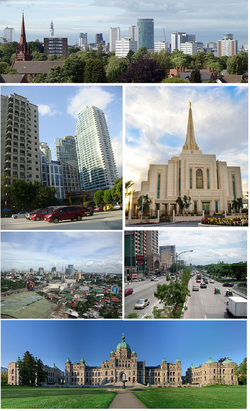Niyi: Difference between revisions
No edit summary |
No edit summary |
||
| (3 intermediate revisions by the same user not shown) | |||
| Line 22: | Line 22: | ||
| leader_name = {{unbulleted list|Amisa Tosha|Matthew Greenfield}} (SDP) | | leader_name = {{unbulleted list|Amisa Tosha|Matthew Greenfield}} (SDP) | ||
| area_total_km2 = | | area_total_km2 = | ||
| population_total = | | population_total = 7,518,673 | ||
| population_as_of = | | population_as_of = 1714 | ||
| population_rank = 1 | | population_rank = 1 | ||
| population_density_km2 = }} | | population_density_km2 = }} | ||
'''Niyi''' is the largest city in [[Sanama]]. The name in [[ | '''Niyi''' is the largest city in [[Sanama]] with 7.5 million inhabitants. The name in [[Sanaman language|Sanaman]] is ''Niyi'', in [[Istvanistani]] and [[Praeta]] ''Nee'', and in [[Cisamarrese language|Cisamarrese]] ''Nea''. Niyi served as the capital of independent Sanama from 1671 to 1679, when the capital was moved to Sanama City, later renamed [[Semisa City]]. Niyi forms the center of the vast Niyi metropolitan area, extending through the people's republic with the same name, into the surrounding areas of [[Pixa Teta]] and [[Harekina]]. With 24.5 million inhabitants as of 1714 in the people's republic, the area is highly urbanised. The city as well as the cities surrounding it inside Niyi PR struggle to keep up with demands for housing, causing improvised urban sprawl on the southern plains. | ||
==Politics== | ==Politics== | ||
Niyi is the capital of the [[Niyi (people's republic)|eponymous people's republic]], established in 1703. After the communes in the city federated to form a citywide district government after the formation of the First Republic, a referendum approved the merger of the city and canton governments | Niyi is the capital of the [[Niyi (people's republic)|eponymous people's republic]], established in 1703. After the communes in the city federated to form a citywide district government after the formation of the First Republic, a referendum approved the merger of the city and canton governments. | ||
==Culture== | ==Culture== | ||
Niyi is considered a melting pot with a large number of different ethnicities represented. | Niyi is considered a melting pot with a large number of different ethnicities represented. 40 percent speak Sanaman and 28 percent Istvanistani, while other nationalities make up 19 percent of the population. | ||
==Transport== | ==Transport== | ||
Latest revision as of 21:19, 27 May 2023
| Niyi | |
|---|---|
| City and borough | |
| Clockwise from the top: Central Business District; Niyi Central Temple; Semisa Nur Pinito Avenue; Senate of Niyi building; Niyi skyline; Easthampton Heights | |
| Nickname(s): The Big N, Nee, The Big Fig | |
| Country | Sanama |
| Province | Niyi |
| Borough | Niyi City and Borough |
| Founded | 1143 AN |
| Government | |
| • Type | City canton |
| • Body | City Canton Coordination Committee |
| • Chairpersons of Niyi City Canton Coordination Committee |
|
| Population (1714) | |
| • Total | 7,518,673 |
| • Rank | 1 |
Niyi is the largest city in Sanama with 7.5 million inhabitants. The name in Sanaman is Niyi, in Istvanistani and Praeta Nee, and in Cisamarrese Nea. Niyi served as the capital of independent Sanama from 1671 to 1679, when the capital was moved to Sanama City, later renamed Semisa City. Niyi forms the center of the vast Niyi metropolitan area, extending through the people's republic with the same name, into the surrounding areas of Pixa Teta and Harekina. With 24.5 million inhabitants as of 1714 in the people's republic, the area is highly urbanised. The city as well as the cities surrounding it inside Niyi PR struggle to keep up with demands for housing, causing improvised urban sprawl on the southern plains.
Politics
Niyi is the capital of the eponymous people's republic, established in 1703. After the communes in the city federated to form a citywide district government after the formation of the First Republic, a referendum approved the merger of the city and canton governments.
Culture
Niyi is considered a melting pot with a large number of different ethnicities represented. 40 percent speak Sanaman and 28 percent Istvanistani, while other nationalities make up 19 percent of the population.
Transport
Niyi hosts three international airports: Malliki Tosha International Airport, Niyi City Airport and Southport International Airport.
